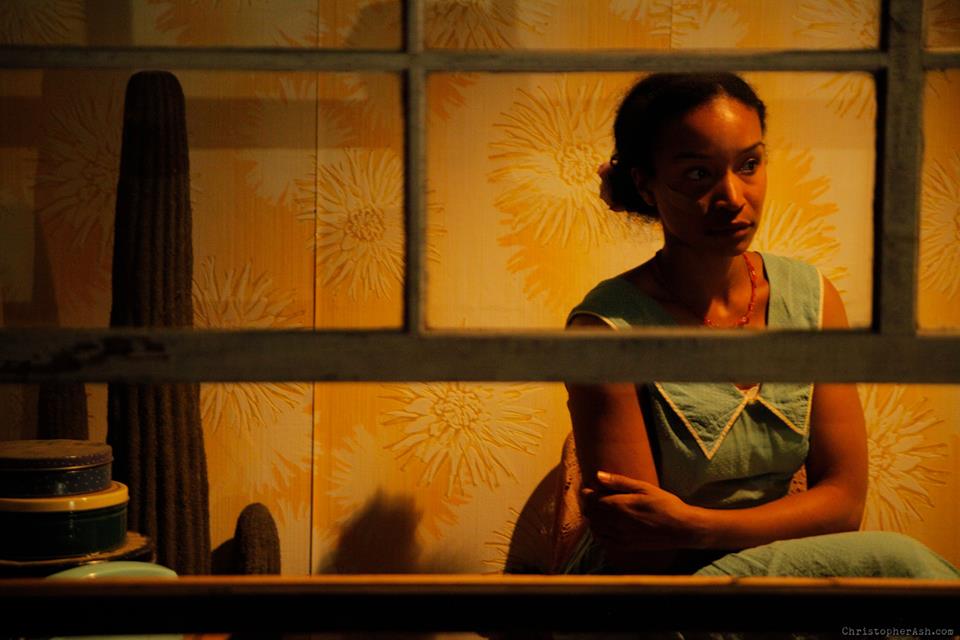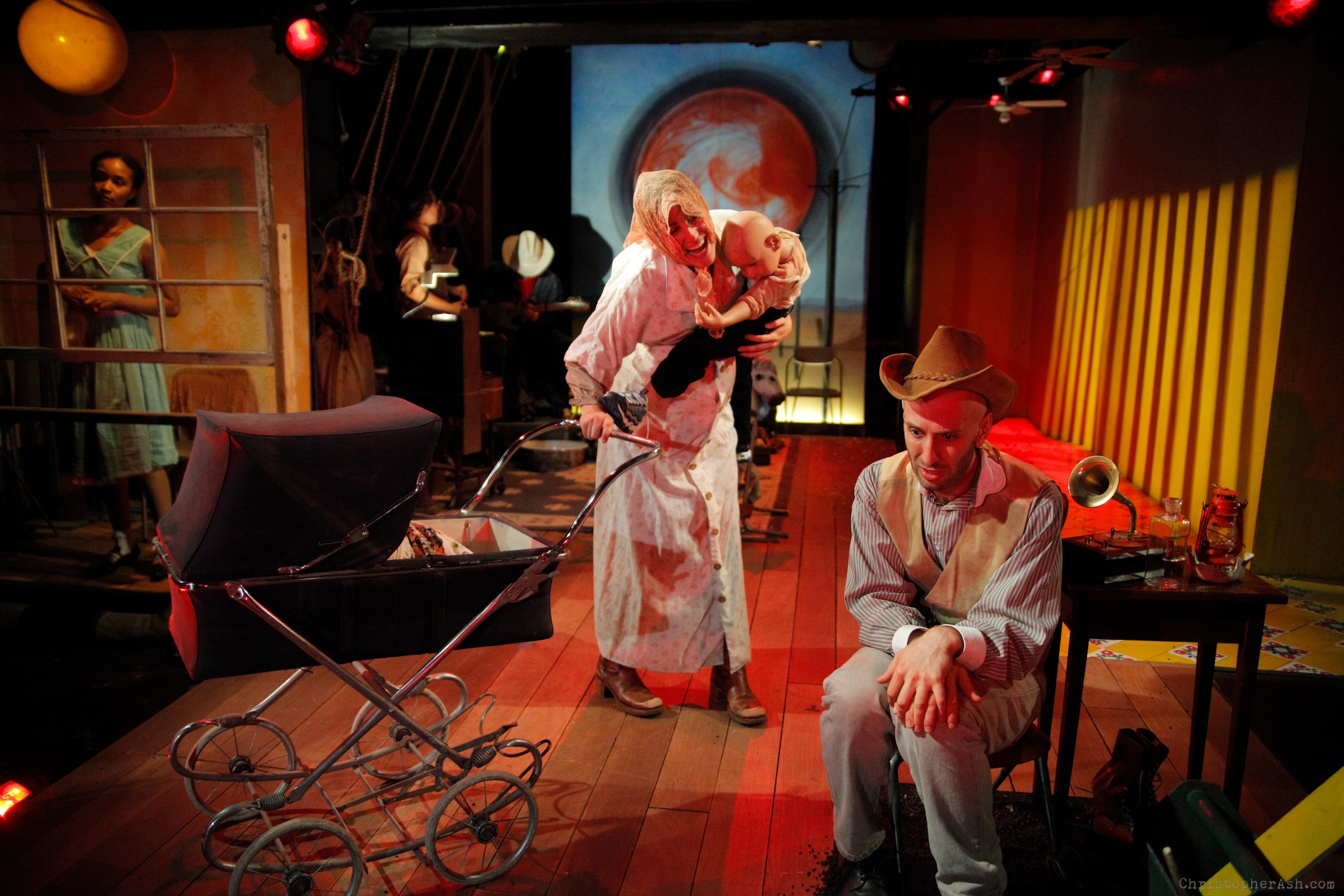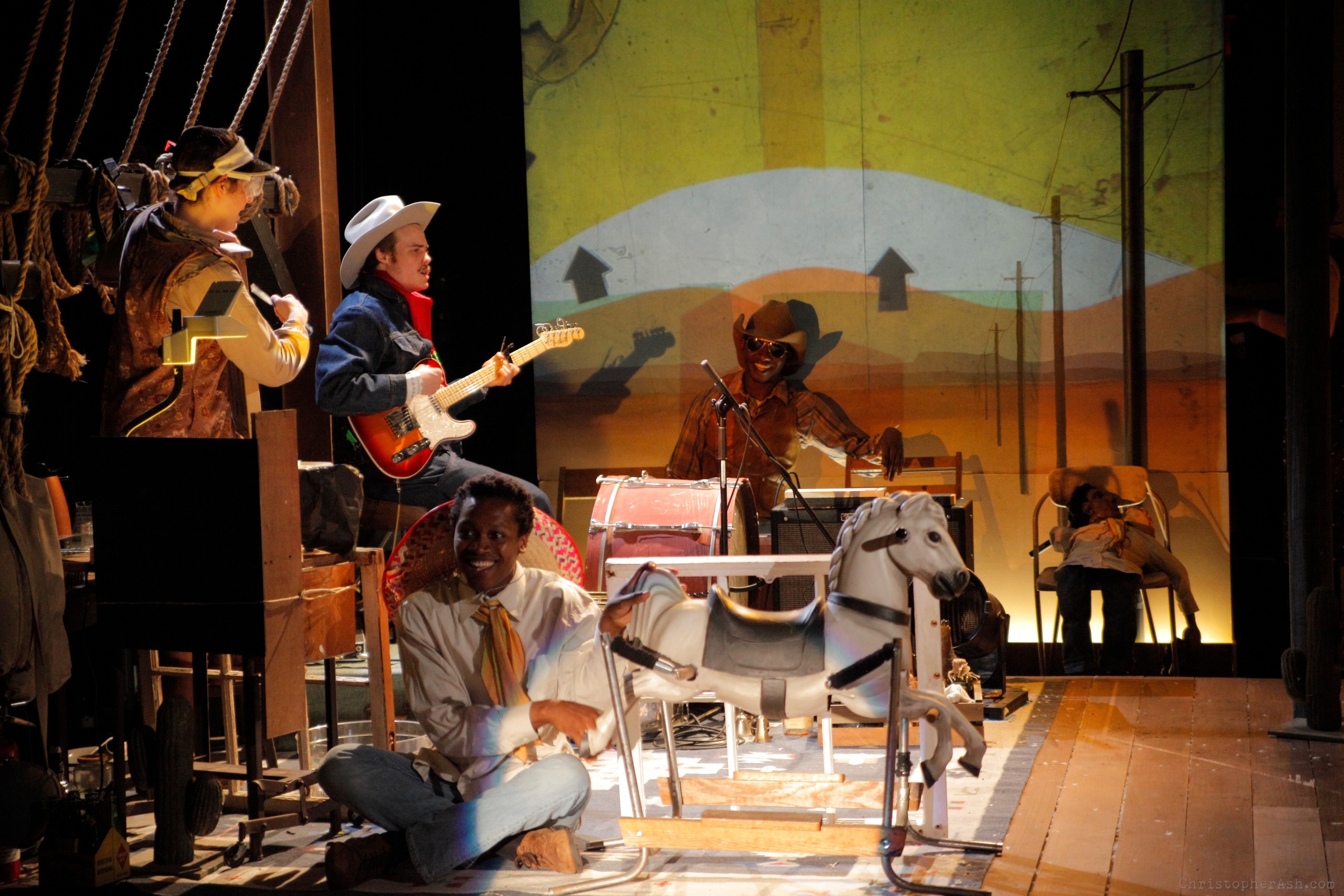The third play in the Yale Summer Cabaret “Summer of Giants” is Federico García Lorca’s The Shoemaker’s Prodigious Wife, a play that departs from the naturalism of the previous play—Strindberg’s Miss Julie—as much as the latter departed from the rhymed farce of Molière’s Tartuffe. Lorca’s play is typical of what we get in theater once naturalism bit the dust—stylized acting, amorphous sets, significant props—and the Cab production, directed by Artistic Director Dustin Wills, goes further, with puppets, projections, a mayor on stilts, comic turns and ambient music. The setting has been transposed from Spain to West Texas, and that’s where the fun starts. The story centers on a young wife (Prema Cruz) married to a shoemaker (Gabe Levey) and the fact that they make each other miserable. As the shoemaker says at one point, “my house isn’t a house, it’s a madhouse!” The wife spends a lot of time chatting with the many interested men in the town—when she’s not reviling her husband or screaming out the window at the townsfolk who mock the couple as a local entertainment. Enough is enough, and so, cursing his sister (“may God rest her soul”) who made the match, the 53 year-old sets off from town and trade, leaving his 18-year-old wife to fend for herself.
If you expect her to dress for fun and flirt like crazy, guess again. She opens up a tavern to pay her way and is no-nonsense with all her drowsy customers, men who congregate but who accept that she’s not up for grabs. But there’s more to it. Lorca fashions a play that explores the wife’s psyche without engaging in psychological realism—providing, for instance, a child from the town who acts as her confidante and informant, and former suitors a bit mythic, and Wills follows Lorca’s logic into some strange byways.
First of all there’s that mayor on stilts (Mickey Theis, sounding and looking like Howard Hughes by way of Leo DiCaprio) who walks softly and wields a big stick (ok, “no symbols where none intended,” as Beckett would say); then there’s Ato Blankson-Wood as the wide-eyed Boy, who is also a puppet and who bursts into a lovely trance-like song about a butterfly, and he also plays Don Blackbird, one of the wife’s admirers equipped with a talismanic version of his namesake; then there’s those neighbors—Ceci Fernandez and Michelle McGregor—who generally carry around windows to suggest their incessant voyeurism, but also become croaking old crones to tell Mr. Shoemaker “the best thing is to take it easy.” And then there’s Mamoudou Athie sporting outrageous accents and insinuating his way into the play in a very amusing fashion.
As the Wife, Cruz isn’t quite as winsome as we might expect an 18 year-old to be but she excels at the “at wit’s end” frenzy that drives her husband away. She always has a soft word for the Boy, and during her husband’s exile grows in stature, but Wills’ production seems loathe to play her for laughs—until the ending. And as Mr. Shoemaker, Levey is a study in constrained complaint, crouched on a low chair with knees high, hugging himself and beseeching heaven. As the Puppet Master who visits the town late in the play, Levey comes into his own, narrating, with the warm manner of a born raconteur, a comic drama uneasily close to home for the Shoemaker’s Wife.
Lorca’s play provides the kind of satisfying closure that we expect from fables and folk tales, though with high irony as well. The Cab’s production respects the material all the way, adding great touches like a Colts-drawn stand-off worthy of a Sergio Leone Western or Quentin Tarantino, and projections that serve to remind us that what we’re watching is taking place in a conceptual space—the play opens with a puppet of The Dramatist (Fernandez, queen of oddball voices) to let us know it’s all “theater”—where the inner landscape is dreamy and tinged with surrealism, like that weird moment with the trampled lamb.
Original music, from Mickey Theis, is atmospheric and pointed enough to carry some scenes on its own, which means that the play gets to take its time, working into moods and out again, while at other moments it switches gears in deliberately jarring ways. Anything to keep us from settling in too easily. Like Theis’ moody guitar, Kate Noll’s set recalls Wim Wenders’ Paris, Texas, that morality tale from the Eighties that also featured a husband on a hegira, with its receding telephone lines in an otherwise desolate place. The openness and depth of the stage works too, giving the set distinct spaces that never quite cohere—light-years away from Miss Julie’s real-as-a-skillet kitchen space.
The Shoemaker’s Prodigious Wife is a pointed comedy, poetic and quizzical with many interesting touches.
The Shoemaker’s Prodigious Wife By Federico García Lorca Directed by Dustin Wills Translated by Gwynne Edwards
Stage Manager: Geoff Boronda; Scenic Designer: Kate Noll; Costume Designer: Seth Bodie; Lighting Designer: Solomon Weisbard; Sound Designer: Nok Kanchanabanca; Production Manager & Technical Director: James Lanius III; Assistant Technical Director: Joey Moro; Artistic Intern & Program Designer: Rocky Bostick; Management Intern: Jonathan Esty
Artistic Director: Dustin Wills; Managing Director: Molly Hennighausen; Associate Artistic Director: Chris Bannow; Associate Managing Director: Anh Le
Photographs by Christopher Ash, courtesy of Yale Summer Cabaret
Yale Summer Cabaret July 11-July 20, 2013


